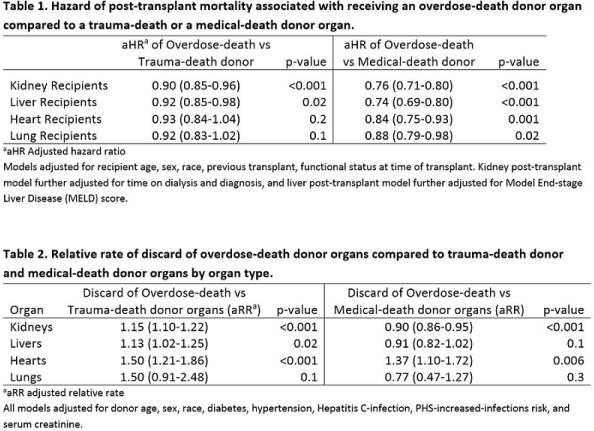Discard and Post-Transplant Outcomes Associated with Organs Donated after Drug-Overdose Death
JHU, Baltimore.
Meeting: 2018 American Transplant Congress
Abstract number: 152
Session Information
Session Name: Concurrent Session: Non-Organ Specific: Disparities to Outcome and Access to Healthcare
Session Type: Concurrent Session
Date: Sunday, June 3, 2018
Session Time: 4:30pm-6:00pm
 Presentation Time: 4:30pm-4:42pm
Presentation Time: 4:30pm-4:42pm
Location: Room 4C-4
The United States faces an overdose epidemic primarily affecting young adults who might represent a novel source of viable deceased-donor organs. Utilization and outcomes associated with overdose-death organs are not well understood.
METHODS: Using SRTR data 2000-2016, we identified 126,999 deceased donors and 315,400 adult kidney, liver, heart, and lung transplant recipients. Deceased donors were categorized as overdose-death, medical-death, or trauma-death. We estimated post-transplant mortality and discard associated with overdose-death donors using adjusted Cox and modified Poisson regressions, respectively.
RESULTS: Overdose-death donor transplants increased from 144 in 2000 to 3,087 in 2016 (1,571 kidney, 885 liver, 401 heart, and 230 lung transplants in 2016). After adjustment, overdose-death kidneys and livers were associated with 10% and 8% lower mortality risk than trauma-death kidneys and livers (p-values<0.05, Table 1, Figure). There were no differences in mortality risk between overdose-death or trauma-death hearts and lungs (p-values>0.05). Overdose-death kidneys, livers, hearts, and lungs were associated with 26%-12% lower mortality risk than medical-death organs (all p-values<0.05). However, overdose-death kidneys, livers, and hearts were 13-50% more likely to be discarded than trauma-death organs (p-values<0.02, Table 2). Overdose-death livers, hearts, and lungs were similarly likely to be discarded than medical-death organs (p-value>0.05), and overdose-death kidneys were 10% less likely to be discarded than medical-death kidneys (p-value<0.001).
CONCLUSIONS: Overdose-death donor transplants were associated with similar or better patient survival, yet overdose-death organs were disproportionately discarded. The transplant community should minimize organ discard from overdose-death donors. 

CITATION INFORMATION: Bowring M., Durand C., Kucirka L., Thomas A., Massie A., Sulkowski M., Cameron A., Desai N., Segev D. Discard and Post-Transplant Outcomes Associated with Organs Donated after Drug-Overdose Death Am J Transplant. 2017;17 (suppl 3).
To cite this abstract in AMA style:
Bowring M, Durand C, Kucirka L, Thomas A, Massie A, Sulkowski M, Cameron A, Desai N, Segev D. Discard and Post-Transplant Outcomes Associated with Organs Donated after Drug-Overdose Death [abstract]. https://atcmeetingabstracts.com/abstract/discard-and-post-transplant-outcomes-associated-with-organs-donated-after-drug-overdose-death/. Accessed February 19, 2026.« Back to 2018 American Transplant Congress
